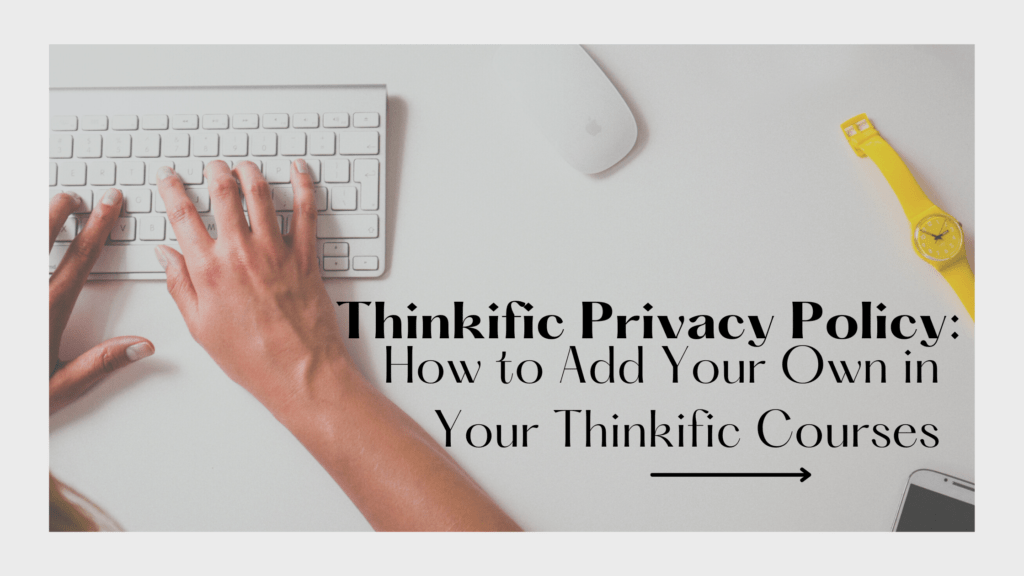As an experienced user of the platform, I can tell you that having a clear and comprehensive privacy policy and terms of use in place is crucial for your online course business. Not only is it a legal requirement, but it also serves as a protection for both you and your students.
Thinkific, as a platform, already has its own privacy policy and terms of use. However, as a course creator, it’s important to also have your own custom policy that outlines how you collect, use, store, and share personal information about your students. This is especially important as it’s a requirement for GDPR compliance.
The General Data Protection Regulation (GDPR) is a regulation introduced by the European Union (EU) to strengthen and unify data protection for individuals within the EU. It replaces the 1995 EU Data Protection Directive. GDPR came into effect on May 25th, 2018, and applies to any organization that processes the personal data of individuals in the EU, regardless of where the organization is based.
Creating and adding these policies to your Thinkific courses is simple, the platform provides you with all the necessary tools and features to easily create and manage your own privacy policy and terms of use. And the best part? You can even create separate policies for each of your courses if you’d like.

> > Click Here to Start Your Free Trial < <
Once you’ve got your policies in place, it’s important to make sure they are easily accessible to your students. Thinkific allows you to add them to your course landing page and check out page, and even link to them in the site footer. This way, your students will always know exactly what they can expect when taking your course.
As for compliance, Thinkific is compliant with GDPR and other data protection regulations. However, it’s always a good idea to double-check with a legal professional to ensure you’re fully compliant and all set.
In summary, with Thinkific, creating and managing a privacy policy and terms of use is simple, and it’s important to make sure they are visible and accessible to your students. This way you can ensure you, and your students, are protected.

Understanding Thinkific’s Privacy Policy and Terms of Use
So, you’re probably wondering what kind of personal information Thinkific collects and how it’s used. Well, let me break it down for you. Thinkific collects information like your name, email address, and payment information when you create an account or purchase a course.
This information is used to provide you with the service and to send you updates and important information about your account and courses.
But don’t worry, Thinkific takes data security seriously. They use industry standard measures to protect your personal information from unauthorized access, use, or disclosure. They also comply with GDPR and other data protection regulations.

> > Click Here to Start Your Free Trial < <
As a user, you also have rights to access and control your personal information. You can request to see what personal information Thinkific has collected about you and request to have it corrected or deleted. You can also request to download your personal data in a structured format.
In addition to the privacy policy, Thinkific also has a terms of use that outlines the rules and expectations for using the platform. This includes things like not sharing your account information or using the platform for illegal activities. It’s important to read and understand the terms of use to ensure that you’re using the platform correctly.
So, now you know what types of personal information Thinkific collects and how it’s used, as well as how your data is protected, how to access and control your personal information and what to expect when using the platform. Stay tuned for the next section where we’ll go over creating a custom privacy policy and terms of use for your Thinkific courses.

> > Click Here to Start Your Free Trial < <
Thinkific Privacy Policy: Creating a Custom Privacy Policy and Terms of Use for your Own Course
Now that you understand Thinkific’s privacy policy and terms of use, you might be wondering if you can create your own custom policies for your courses. This is extremely important for teachers and other users who use Thinkific as their main business platform.
Luckily, the answer is yes! In fact, it’s a great idea to have your own policies that specifically outline how you handle personal information for your courses. This is a great way to ensure that each of your courses has its own set of rules and expectations, as well as its own privacy policy.
To create your custom policies, you’ll want to start by outlining what personal information you collect and how it’s used in your course. You’ll also want to include information on data security measures and your students’ rights to access and control their personal information. And don’t forget to include any rules and expectations for using your course, just like Thinkific’s terms of use.
The Step-by-step guide below will be a clearer guide on what to do when making your Privacy Policy
Creating your Thinkific Courses Privacy Policy:
- Start by outlining what personal information you collect and how it’s used in your course.
- Include information on data security measures and your students’ rights to access and control their personal information.
- Add any rules and expectations for using your course.
- Use plain and simple language.
- Have a legal professional review it to make sure it’s compliant with all applicable laws “Settings” and “Policies” section, and input your custom policies and regulations.
Once your policies are created, you can add them to your Thinkific course by going to the “Course Settings” and “Policies” section, and inputting your custom policies.

> > Click Here to Start Your Free Trial < <
Tips to ensure that your policies are compliant with all applicable laws and regulations
When you’re creating a custom privacy policy and terms of use for your Thinkific courses, it’s important to make sure you’re following all the laws and regulations out there. That means being compliant with things like the General Data Protection Regulation (GDPR) and any other data protection laws that apply to your business. Here are a few best practices to keep in mind:
- Get some legal help: It’s always a good idea to talk to a lawyer to make sure your policies are good to go legally-speaking. They can help you make sense of the laws and make sure your policies meet all the requirements.
- Keep it simple: Your policies should be easy for your students to understand. Avoid using legal jargon or technical terms and make sure your students know what they’re agreeing to and what their rights are.
- Be upfront about what you’re collecting: Make sure your privacy policy clearly explains what types of personal information you collect, why you need it, and how you’re using it. This helps your students understand what they’re signing up for when they give you their personal information.
- Give students a way to opt-out: Your privacy policy should include clear instructions on how students can stop you from collecting or using their personal information. This includes things like unsubscribing from your email list or asking you to delete their data.
- Review and update regularly: Laws and regulations can change over time, so it’s important to review and update your policies regularly to make sure they’re still compliant.
By keeping these best practices in mind, you can create custom policies that are compliant with all the laws and regulations, and protect both you and your students. Remember GDPR is a regulation introduced by the European Union (EU) to strengthen and unify data protection for individuals within the EU. It applies to any organization that processes the personal data of individuals in the EU, regardless of where the organization is based.
Stay tuned for the next section where we’ll go over how to integrate your policies into your site and make them easily accessible to your students.
Thinkific Privacy Policy: Site Integration
So, you’ve got your custom privacy policy and terms of use all set up and ready to go. Now what? The next step is to make sure your students can actually find and read them. Here are a few tips for integrating your policies into your Thinkific site:
- Add them to your course landing page: This is a great place to put your policies because it’s one of the first things students will see when they visit your course. You can easily add links to your privacy policy and terms of use on your course landing page using Thinkific’s built-in course editor.
- Add them to your check-out page: Your students will also see your policies when they’re ready to purchase your course, so it’s a good idea to include links to them on your check-out page as well.
- Link to them in your site footer: This is a great way to make sure your policies are always accessible to your students, no matter where they are on your site. You can easily add links to your policies in the footer of your Thinkific site using the platform’s built-in site editor.
- Make them easy to find: Make sure your policies are easy to find and understand. You can use clear and simple language, and use headings and bullet points to break up the text and make it easy to read.
One should always remember that the more visible and accessible your policies are, the better it is for both you and your students. Not only does it protect you legally, but it also builds trust with your students as they can see you are transparent and take their privacy seriously.
Plus, Thinkific provides the tools to customise your policies and make them look nice and professional, so there’s no excuse not to make them easily accessible.

> > Click Here to Start Your Free Trial < <
Thinkific Privacy Policy: Compliance and Best Practices
So, you’ve got your custom privacy policy and terms of use all set up and looking great. But, it’s not just about having them, it’s about making sure they’re compliant with all the laws and regulations out there. Here’s a quick rundown on what you should keep in mind:
- Use the right terms of use and privacy policy for your site: Make sure you’re using the right type of policy for your business and the type of information you collect from your students.
- Be aware of your responsibilities: As a Thinkific course creator, it’s your responsibility to make sure your policies and practices are compliant with all applicable laws and regulations, including GDPR.
- Get a legal review: It’s always a good idea to have a legal professional review your policies to make sure they’re up to snuff.
- Keep up with updates: Laws and regulations are constantly changing, so make sure you keep an eye out for updates and make changes as needed.
- Check out additional resources: There are plenty of resources out there to help you understand and comply with data protection regulations, such as the Thinkific’s compliance center.
By keeping these best practices in mind, you can ensure that your privacy policy and terms of use are not only well-written, but also compliant with all the laws and regulations. This way, you’ll have peace of mind knowing that you’re protecting both yourself and your students.
Thinking Privacy Policy Conclusion
So there you have it, folks! We’ve covered everything you need to know about creating, managing, and integrating your custom privacy policy and terms of use on Thinkific. We’ve discussed the importance of having a privacy policy and terms of use, as well as the importance of making them visible and accessible to your students.
We’ve also covered the basics of Thinkific’s own privacy policy and terms of use, and discussed best practices for ensuring your policies are compliant with all applicable laws and regulations. We’ve even provided tips and resources for making your policies easy to find and understand.
In conclusion, having a custom privacy policy and terms of use in place is crucial for any online course business, and Thinkific makes it easy to create and manage your own. By following the tips and best practices outlined in this article, you can make sure your students are protected and informed, and you’re in compliance with all applicable laws and regulations.
And as always, if you have any questions or need additional resources, don’t hesitate to reach out to a legal professional or check out Thinkific’s help center. Happy teaching!
 > > Click Here to Start Your Free Trial < <
> > Click Here to Start Your Free Trial < <
Frequently Asked Questions on Thinkific Privacy Policy:
Q: What is a privacy policy and terms of use?
A: A privacy policy is a legal document that outlines how an organization collects, uses, stores, and shares personal information about its users.
A “terms of use”, also known as terms of service, is a legal agreement that outlines the rules and expectations for using a service or platform.
Q: Why is it important to have a privacy policy and terms of use in place for my online course business?
A: Having a clear and comprehensive privacy policy and terms of use in place is crucial for your online course business as it is a legal requirement, and also protects both you and your students.
Q: What is GDPR and how does it relate to my online course business?
A: GDPR stands for General Data Protection Regulation.
It is a regulation introduced by the European Union (EU) to strengthen and unify data protection for individuals within the EU. It replaces the 1995 EU Data Protection Directive. GDPR came into effect on May 25th, 2018, and applies to any organization that processes the personal data of individuals in the EU, regardless of where the organization is based. As a course creator, it’s important to also have your own custom policy that outlines how you collect, use, store, and share personal information about your students. This is especially important as it’s a requirement for GDPR compliance.
Q: Can I create my own custom privacy policy and terms of use for my Thinkific courses?
A: Yes, Thinkific provides you with all the necessary tools and features to easily create and manage your own
Q: What kind of personal information does Thinkific collect?
A: Thinkific collects information such as name, email address and payment information when a user creates an account or purchases a course.
This information is used to provide the service and to send updates and important information about the account and courses to the user.
